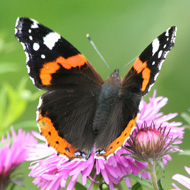Weather leaves outlook ‘gloomy’ for UK butterfly population

In the largest of its kind worldwide, the survey encourages people to spot and record eighteen of the UK’s common butterfly species during a three-week period.
After a slow spring and a wet June, sightings of UK butterflies are down on last year. Butterfly Conservation president Sir David Attenborough is urging the public to participate in this year’s ‘Big Butterfly Count’ to gather vital information about the effects of the poor weather.
Cold wet weather conditions can reduce opportunities for butterflies to eat and breed, and warmer weather is crucial if dwindling numbers are to recover from a cold March and an April that saw widespread snowfall.
In the largest of its kind worldwide, the survey encourages people to spot and record eighteen of the UK’s common butterfly species during a three-week period.
Sir David Attenborough said: “We must make sure these losses are halted and reversed but in order to achieve this we first need to find out as much information about our butterflies as possible.”
With the UK seeing a decline in over three-quarters of its species, the Big Butterfly Count is being launched at the Wildfowl and Wetlands Trust London Wetland Centre and is available as an app to further encourage important participation.
Sir David added: “We live busy lives that are increasingly detached from the natural world, so taking 15 minutes out to simply watch wildlife is not only helping butterflies but is also good for our own wellbeing as well as helping wildlife.”
The count runs from 15 July to 7 August and sightings can be submitted at www.bigbutterflycount.org



 The Animal and Plant Health Agency (APHA) has updated its online reporting service for dead wild birds.
The Animal and Plant Health Agency (APHA) has updated its online reporting service for dead wild birds.